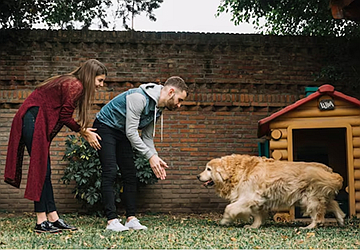Dive into 'What You Should Know About Pet Adaptation: A Guide To Welcoming A Rescue Animal.' Equip yourself with essential insights to make your new pet's transition into your home as smooth and loving as possible.
Adopting a rescue animal is a noble and heartwarming journey filled with unique joys and challenges. "What You Should Know About Pet Adaptation: A Guide To Welcoming A Rescue Animal" is crafted to guide you through integrating your newest family member into its forever home.
From understanding their past traumas to celebrating their tiny victories, let this guide be your compass in ensuring your pet feels safe, loved, and at home.
When you take the admirable step of adopting rescue pets, you're saving a life and giving a deserving animal a fresh start. Pet adoption is a beautiful journey filled with love, patience, and dedication. As wonderful as the experience is, it's essential to understand the challenges that might arise and how to address them best. This guide aims to shed light on the adaptation process for shelter animals and how to make their transition to your home as seamless as possible.

Every year, millions of animals find their way into shelters. You're offering them a second lease on life by choosing to adopt a pet. Beyond providing them with a loving home, you're also making room for other needy shelter animals, playing a significant role in giving pets a second chance.
The majority of rescued animals have a past, and some of them have been through harrowing ordeals. It is essential to treat their history with the sensitivity it deserves, regardless of whether they have been neglected, abused, or have endured any other kind of adversity. This comprehension will be essential in directing how you converse with and care for your recently acquired companion.
The initial weeks following pet adoption can be both exciting and challenging. Remember, everything is new for your rescue animal - from the sights and sounds to the very feel of their new home. Make their space as comfortable as possible, allowing them to explore quickly. Avoid loud noises and sudden movements, as these might startle them.
Adopting rescue pets requires a great deal of patience. They might be wary or fearful initially. Engage with them gently, using a calm voice and non-threatening body language. Over time, with consistency and love, you'll see their trust in you grow.
Training is an essential component in the process of adjusting to new circumstances. Not only can it assist in the adjustment of undesirable behaviors, but it also provides an opportunity for you and your pet to form a closer bond. Use positive reinforcement tactics, such as praising and rewarding them for excellent behavior. Remember that punishment might not be the best solution, especially for animals with a history of traumatic experiences.

The process of reintroducing your rescued animal to both other animals and people should be done in stages. Start with brief, well-managed exchanges, then progressively lengthen the time spent together. Ensure they are at ease by paying close attention to their physical behavior.
Protecting the rescue animal's health and happiness is essential to adopting an animal from a shelter. Make an appointment with the vet as soon as possible following the adoption. They must go in for checkups regularly so that their health can be monitored, vaccinated, and any potential health issues may be addressed.
Your pet's mental and emotional well-being is equally as important as their physical health. Establish a routine for them, participate in the activities they enjoy, and give them toys. This quiet can reassure the animals, particularly those from troubled pasts.
Every achievement your rescued animal makes in being comfortable in its new environment is a milestone. Celebrate every stage of their development, from the first time they come to you for a hug to the first time they purr or yelp with excitement. They indicate that your pet is more at ease and trusting in their new surroundings.
Adopting rescue pets isn't just about the initial days or weeks; it's a lifelong commitment. Your home becomes their forever home. Your love, care, and patience will pave the way for an unbreakable and advantageous bond.
When bringing a rescued animal into your house, especially one that has been through a traumatic situation, it is imperative to provide them with a secure refuge as soon as possible. If things get too stressful for them, designate a calm area in your house where they can go to get some space. This space can function as their haven if it is furnished with their bed, toys, and a few of their personal belongings.
Engaging in regular playtime is not just fun, but it also offers an avenue for shelter animals to expend pent-up energy. Every animal, irrespective of their background, has a playful side. Discovering toys and game, they love can be a bonding experience. Whether it's a feather wand for cats or a fetch ball for dogs, find what tickles their playful bone.
Grooming is an essential component of responsible pet ownership. Grooming rescued animals serves to keep their appearance in good shape and has the potential to be therapeutic for them. For example, a light brushing can be comforting and function as a bonding exercise between two people. Additionally, during grooming sessions, you can look for any indications of potential health problems, such as skin infections or external parasites.
Pet adoption is undeniably one of the most fulfilling experiences, intertwining challenges with unparalleled joy. By choosing to adopt a pet, especially one from a shelter, you're embarking on a journey of giving an animal the life they deserve. While requiring patience, the adaptation process offers countless moments of love, trust-building, and joy. Remember, every rescue pet has a story. By welcoming them into your home, you offer them a beautiful new chapter filled with hope, love, and endless cuddles.